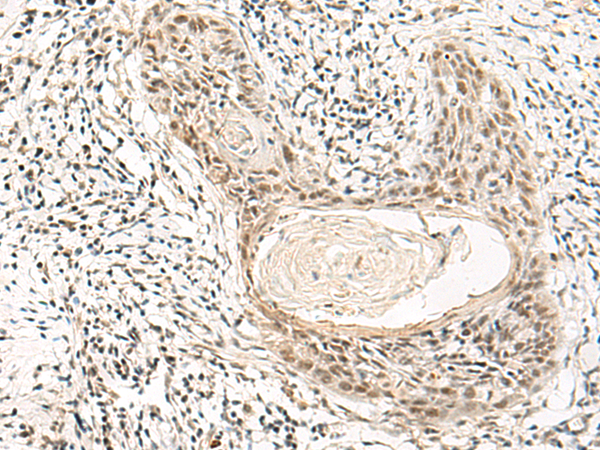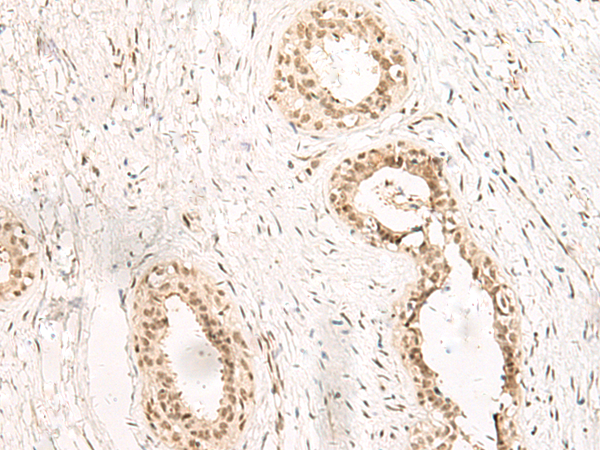

| WB | 咨询技术 | Human,Mouse,Rat |
| IF | 咨询技术 | Human,Mouse,Rat |
| IHC | 1/20-1/100 | Human,Mouse,Rat |
| ICC | 技术咨询 | Human,Mouse,Rat |
| FCM | 咨询技术 | Human,Mouse,Rat |
| Elisa | 1/5000-1/10000 | Human,Mouse,Rat |
| Aliases | BFPP; BPPR; GPR56; TM7LN4; TM7XN1 |
| Host/Isotype | Rabbit IgG |
| Antibody Type | Primary antibody |
| Storage | Store at 4°C short term. Aliquot and store at -20°C long term. Avoid freeze/thaw cycles. |
| Species Reactivity | Human |
| Immunogen | Synthetic peptide of human ADGRG1 |
| Formulation | Purified antibody in PBS with 0.05% sodium azide and 50% glycerol. |
+ +
以下是3篇关于ADGRG1抗体的参考文献及其摘要概括:
---
1. **文献名称**: "ADGRG1 regulates glioblastoma progression via TGF-β signaling"
**作者**: Heinrich, C. et al.
**摘要**: 该研究利用抗ADGRG1抗体进行免疫组化分析,发现ADGRG1在胶质母细胞瘤中高表达,并通过激活TGF-β信号通路促进肿瘤侵袭,提示其作为治疗靶点的潜力。
2. **文献名称**: "Mechanistic insights into ADGRG1-mediated signaling in vascular development"
**作者**: Kishore, A. & Liebscher, I.
**摘要**: 通过ADGRG1抗体阻断实验,研究揭示了ADGRG1通过调控G蛋白偶联受体活性参与血管生成,为心血管疾病模型提供分子机制支持。
3. **文献名称**: "ADGRG1 as a biomarker for metastatic breast cancer"
**作者**: Chen, L. et al.
**摘要**: 该研究使用ADGRG1抗体进行流式细胞术和Western blot,证实ADGRG1在乳腺癌转移患者中异常高表达,并与不良预后显著相关,提出其作为转移预测标志物的可能性。
---
以上文献均以ADGRG1抗体为核心实验工具,涵盖肿瘤机制、血管发育及癌症诊断领域。如需具体期刊或年份信息,可进一步补充关键词检索。
ADGRG1 (Adhesion G Protein-coupled Receptor G1), also known as GPR56. is a member of the adhesion-GPCR family involved in diverse cellular processes, including cell adhesion, signaling, and tissue development. It features a large extracellular N-terminal region with adhesion-related domains and a seven-transmembrane domain characteristic of GPCRs. ADGRG1 plays critical roles in brain development, immune regulation, and tumor biology, with dysregulation linked to disorders like bilateral frontoparietal polymicrogyria and cancers (e.g., gliomas, melanomas).
ADGRG1 antibodies are immunological tools designed to detect and study this receptor’s expression, localization, and function. They are widely used in techniques such as Western blotting, immunohistochemistry (IHC), and flow cytometry. These antibodies typically target specific epitopes within the extracellular or intracellular regions, aiding in research on ADGRG1’s role in cell proliferation, migration, and mechanotransduction. In cancer studies, ADGRG1 antibodies help investigate its dual role as both a tumor suppressor and promoter, depending on cellular context. Additionally, they contribute to biomarker validation and therapeutic targeting strategies. Commercial ADGRG1 antibodies are available in polyclonal and monoclonal formats, often validated for specificity and application compatibility, supporting basic and translational research in neurobiology, oncology, and immunology.
×